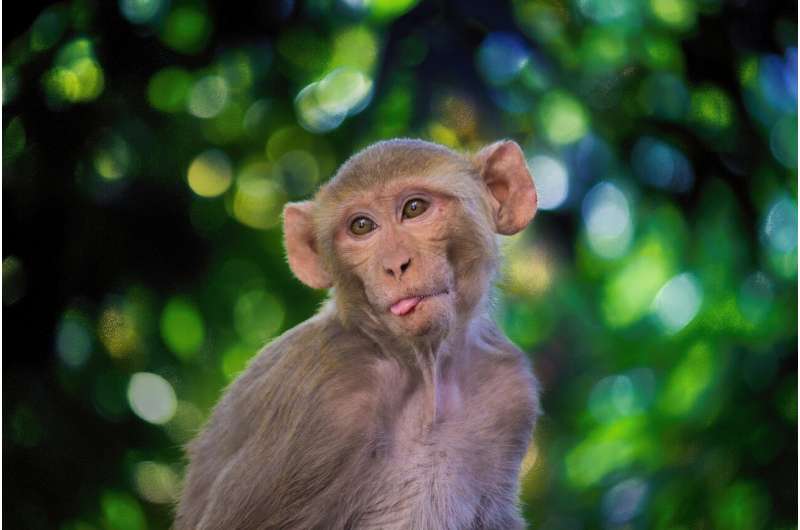Does a candidate’s appearance affect how we vote? There’s growing evidence that suggests the answer may be yes. In a recent study published on the preprint server bioRxiv, neuroscientists at the University of Pennsylvania and the Champalimaud Center for the Unknown in Portugal had monkeys look at pictures of political candidates from past U.S. races.
The monkeys tended to avoid looking at candidates with masculine facial features such as wide jaws and less prominent cheekbones, focusing instead on contenders who lost their elections.
This study supports previous research that suggests humans have some kind of shared assumption about what makes a face look dominant or competent, said Christopher Olivola, a psychologist and an associate professor of marketing at Carnegie Mellon University in Pennsylvania, who was not involved in the study.
He added that there’s a tendency for candidates who look a certain way to garner more votes, though looks don’t guarantee victory.
The findings come after a recent poll of over 10,000 Americans found more than a third believed physical appearance was “somewhat important” for both male and female candidates.
Studies dating back to the late 1970s have found first impressions were significantly correlated with how well a candidate did. Over two decades later, research by psychologist Alexander Todorov came to similar conclusions: the perception of a candidate’s physical appearance augured their success.
In one 2007 study, Todorov found that around 70% of congressional candidates who appeared more trustworthy, based merely on glances at their faces, won the election.
“We never told our test subjects they were looking at candidates for political office—we only asked them to make a gut reaction response as to which unfamiliar face appeared more competent,” said Todorov in 2007. “The findings suggest that fast, unreflective judgments based on a candidate’s face can affect voting decisions.”
Even children demonstrate a similar predictive ability, at least according to a 2009 paper exploring the phenomenon among preschool-aged kids in Switzerland.
This research intrigued Michael Platt, a neuroscientist and director of the Wharton Neuroscience Initiative at the University of Pennsylvania, who led the newest study.
“It starts to beg the question: What’s going on? Are we really making judgments on the policies of these candidates or their platforms or parties? I mean yes, those things matter,” Platt said. “But if kids can do it, we thought, well, they’re relying on some kind of cue in the face that’s influencing their behavior. We thought, ‘I bet monkeys do it, too.'”
Platt and Yaoguang Jiang, the study’s first author and a neuroscientist in Platt’s lab at the university, devised an experiment where they showed three male rhesus macaques photos from 124 gubernatorial races from 1996 to 2006, 149 senatorial races from 2000 to 2008 and all presidential (and vice presidential) races between 2000 and 2020
The images, taken from online sources and rendered in grayscale, included both male and female candidates.
While looking at paired photos of opposing candidates, a computer tracked the monkeys’ gaze, which tended to fixate longer on the losing candidate.
For the senatorial and gubernatorial races, the monkeys were about 54.6% accurate in picking the loser. When both candidates were male, their accuracy was about the same, at 54.4%. While those percentages don’t seem like a lot, the researchers say they are more than what would be expected if left up to chance.
The results were a toss-up for presidential elections: The monkeys were only about 50% accurate in picking the loser. Age and gender were likely more complicating factors in the smaller sample size.
“Monkeys absolutely prefer to look at females over males,” Jiang said. “Monkeys don’t consider older candidates to be dominant, so they’re not intimidating.”
Platt said facial features such as the width of the jaw relative to the cheekbone serve as social cues for masculinity. In his team’s study, the winning candidate’s jaw, on average, was 2% more prominent than that of the losing candidate.
The researchers say their findings indicate a potential evolutionary basis for why we may perceive someone as powerful or capable just from looks.
“Our lab, as well as many other labs, has been involved in tracing out the neural circuitry that supports our social lives. I don’t want to say it’s identical, but [this circuitry] is virtually the same in monkeys and humans. … It’s an adaptation for living in complex social environments where you have to balance cooperation and competition,” Platt said.
Olivola, of Carnegie Mellon University, is skeptical of whether evolution is the underlying cause.
“Unfortunately, our ancestors didn’t select leaders. They weren’t choosing, [rather] submitting,” Olivola said. “The most popular guy won. He could have been the guy with the biggest stick or sword. … The idea that we evolved for something that, at the time, didn’t even happen doesn’t make sense at face value.”
Additionally, the ability to predict who will win based on looks alone isn’t necessarily an accurate predictor of whether that candidate will be an effective political leader, Olivola said.
“Just because a person won an election doesn’t mean they are the better candidate. There are plenty of reasons why people win elections that have nothing to do with [their appearance].”
Other studies find physical appearance matters less for politically knowledgeable voters and voters with less visual exposure to the candidates.
Looks may serve as a sort of red herring. A 2018 study by Olivola and Todorov found Republicans were more likely to vote for a candidate with a conservative-looking face, even if that candidate was a Democrat. The same study found Democrats and liberals may be less swayed by facial stereotypes.
So what do the monkeys predict for the 2024 U.S. election?
There’s no clear winner among the presidential nominees. The primates were divided between Vice President Kamala Harris and former President Donald Trump, but seemed to lean toward vice-presidential nominee Tim Walz over Sen. JD Vance.
Miriam Fauzia is a science reporting fellow at The Dallas Morning News. Her fellowship is supported by the University of Texas at Dallas. The News makes all editorial decisions.
More information:
Yaoguang Jiang et al, Monkeys Predict US Elections, bioRxiv (2024). DOI: 10.1101/2024.09.17.613526
2024 The Dallas Morning News. Distributed by Tribune Content Agency, LLC.
Citation:
What monkeys might teach us about evaluating presidential candidates (2024, October 31)
retrieved 31 October 2024
from https://phys.org/news/2024-10-monkeys-presidential-candidates.html
This document is subject to copyright. Apart from any fair dealing for the purpose of private study or research, no
part may be reproduced without the written permission. The content is provided for information purposes only.

